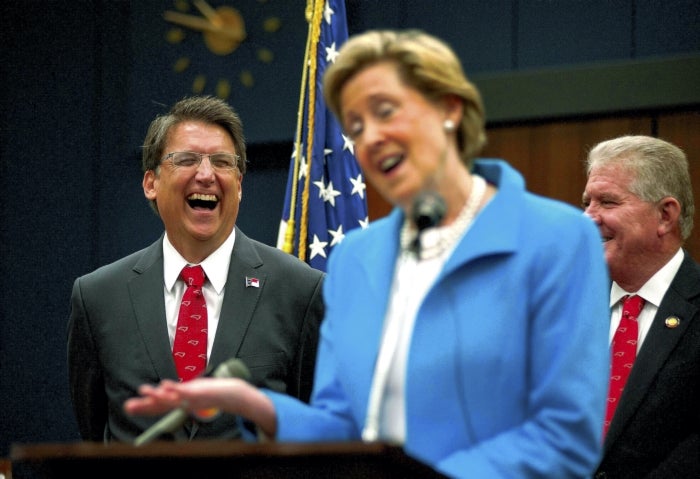Kluttz brings governor to town, touts tax credits
Published 12:10 am Tuesday, February 10, 2015

- North Carolina Governor Pat McCrory and North Carolina Secretary of Cultural Resources Susan Kluttz came to Salisbury to bring attention to the Historic Tax Credits. State and federal tax credits are credited for the ability for spur renovation of historic residences and buildings by owners. The previous historic tax credit legislation has expired but many, including the governor, believe that they benefit the state and local communities. A large number of buildings in Salisbury would not have been restored without the former credits. JON C. LAKEY / SALISBURY POST
Cultural Resources Secretary Susan Kluttz returned home Monday and brought her boss along for the ride.
Gov. Pat McCrory and Kluttz, the former mayor of Salisbury, toured downtown and spoke about the value of restoring the state’s historic tax credits, which expired at the end of 2014. The stop was the 19th on Kluttz’s statewide tour to promote the credits’ revitalization, she said.
Kluttz said public awareness would be valuable in a restoration effort, but also cited economic benefits in a speech at Salisbury City Hall.
“We are here today because, frankly, we have a crisis in Raleigh,” Kluttz said. “As you know, the tax credits expired at the end of the year, and it’s critical they be restored for economic recovery and Governor McCrory’s Carolina comeback. … Let’s not lose our past as we look toward our future.”
The tax credits proposed by the N.C. Department of Cultural Resources and backed by McCrory would start at 15 percent for commercial projects, Kluttz said after her speech. Additional percentage points could be added depending on the type of project, but Kluttz said a per-project cap would exist. The cap wouldn’t apply to percentages, but to the dollar amount doled out. She said the lower percentage — the previous state credit started at 20 percent – was a form of compromise with any opponents of the tax credit’s restoration.
The tax credits first took effect in 1998. Since then, the credits have resulted in more than $1.6 billion in investment across the state, with 90 of North Carolina’s 100 counties using the tax credit. As a result of the credit, investment in Rowan County has topped $20 million. Rowan ranks near the top of the state in terms of tax credits used for commercial property rehabilitation.
After her speech at city hall, Kluttz said some opposition to a tax credit restoration exists in Raleigh. Kluttz said the reason for some opposition is an effort in the state legislature to reform tax laws. One of the ideas Kluttz said she’s heard is giving out grants instead of a tax credit.
“Grants for this would not work,” she said. “We do not want to be picking winners and losers ahead of time, because this program is available to every single person in North Carolina equally and fairly and that’s the way we feel it should be.”
As a part of his speech, McCrory also addressed any potential opposition to bringing back the tax credit.
“I’m a conservative, and I’m a Republican, and I believe we should encourage reinvestment by the private sector. Isn’t that what it’s all about?” McCrory asked. “Regardless of where you are in the political spectrum, it’s encouraging investment. It’s also encouraging investment to preserve the history, which reminds the next generation how we got here.”
McCrory recalled his days as a student at Catawba College, saying downtown Salisbury was run-down when he attended the school in the 1970s.
“When I was a student at Catawba college in the 1970s, I’ve got to be frank with you, students didn’t come to downtown Salisbury. We stayed on campus, because downtown Salisbury was an area of blight and decay and not a lot of activity” he said. “Thankfully, after years and years of leadership, downtown Salisbury is now a destination — a destination where you can shop, a destination where you’ve got great deli sandwiches, a destination where you have great ice cream at the corner.”
Near the end of his speech McCrory said he planned to introduce the credit as a part of his budget proposal in the next few weeks.
Kluttz and McCrory paused to mingle with a few attendees of the news conference before hopping on trolleys and touring two historic buildings in downtown Salisbury — one commercial and one residential. They were followed by a throng of other state and local officials.
Spectators clearly noticed the small caravan of trolleys and police cars. One spectator jokingly yelled at the governor’s trolley and asked for McCrory to lower taxes.
The commercial property toured by the crowd of people was the former Bernhardt Hardware Building, including the new location of Sweet Meadow Cafe. The governor’s tour also included the Fulton-Mack-Blackmer House, on Fulton Street. He moved swiftly through both locations, with the throng of state and local officials on the tour moving briskly to keep up.
After touring the Fulton-Mack-Blackmer House, McCrory and his staff skipped the trolleys and walked from Fulton Street to Emma’s of Salisbury for lunch.
Kluttz said her tax credit tour continues until late March. Kluttz and other organizations have created a website — historictaxcredits.org — with a petition that’s already got close to 5,000 signatures.
Contact reporter Josh Bergeron at 704-797-4246.




